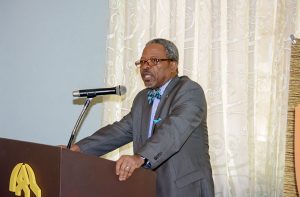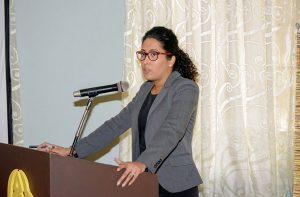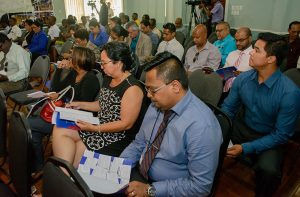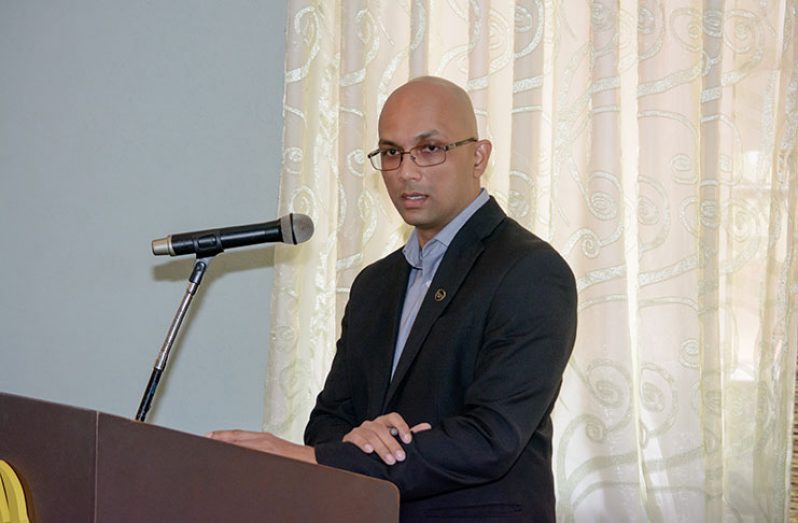President of the Georgetown Chamber of Commerce and Industry (GCCI), Vishnu Doerga has called on the Guyana Revenue Authority (GRA) to go after tax cheats, even as he urged the administration place more attention on legislation and opportunities that will lift persons out of poverty and enhance their lives.
Doerga was at the time speaking at the entity’s Annual General Meeting (AGM) stressed that the Private Sector was a key player in the value chain as it was the private sector that created lots of employment.

The GCCI President noted the early preparation and presentation of budgets since the APNU+AFC coalition government took office in 2015 but made it clear that the presentation of early budgets without spending was of no use to the economy. “If the money isn’t spent then it doesn’t find itself back into the economy and it is of no use,” Doerga added.
Recently it was revealed that a number of private schools and businesses were evading taxes and the GRA was urged to take steps to make these entities compliant. Doerga said the GCCI will ramp up advocacy for its membership and signaled that it will be extra vigilant so that those in authority can take corrective action when necessary.
“We do want a tax structure that reduces burden and intensifies growth for the compliant,” Doerga stressed noting that often time, compliant tax payers, businesses are made to pay the price for the non-compliant. He believes that the Guyana Revenue Authority (GRA) ought to pay more attention to those who are non-compliant with the tax regime.
Meanwhile, at the 127th Annual General Meeting, the GCCI announced that the entity had growth over the past year with a recorded surplus of $5.7M. This represents a significant increase of nearly over 360 per cent, Doerga told members of the organisation at the AGM held at Duke Lodge, Kingston.
According to Doerga, the entity has faced many challenges over the years and was lagging in a deficit in its financial operations for some time and noted that its executive had been tasked with finding ways to deliver more to its membership.

In an effort to enhance its financial standing the Chamber’s president noted that some key areas were focused on while adding that the surplus generated will be used to operate the capacity of the organisation.
“We have been able to move from that position of deficit two years ago. Three years ago also our membership was lagging around in the 120s to a position where we now added value to our organisation and we have returned to a position of financial soundness as you can see in the annual report.”
There has been a 25 per cent increase in membership representing an increase of 38 members to the organisation. Doerga disclosed that notwithstanding the challenges facing the Chamber, it has continued to build its relationship with the Caribbean Development Bank (CDB) and was able to secure two grants from the CDB.
The grants are aimed at improving export readiness within local enterprises in the creative industries, and agro processing and also enhancing the capacity of business support organisation. Each one of these projects Doerga stated is geared at building capacity of local businesses.
Additionally, the GCCI president said the organisation had signed a Memorandum of Understanding (MOU) with CUSO International, the Small Business Bureau and another entity for the establishment of a local business incubator which is geared at providing valuable support to start-up businesses. That project was currently awaiting funding to be successful.
Moreover, the body is working with the Trinidad and Tobago Chamber of Commerce on a trade mission scheduled for June “where we will be looking at linking our businesses with visiting businesses …developing trade deals out of that.”
Meanwhile, Vice-Chancellor of the University of Guyana (UG) Professor Ivelaw Griffith continued his pitch to the private sector to invest in the University of Guyana. Professor Griffith since his return to Guyana to take up the post of Vice-Chancellor some months ago has been pleading with the private sector to do more for the institution.
He described UG as an “educational sea with troubled waters” and noted that he was attempting to build a bridge to cross the sea. The bridge he called “the Renaissance Bridge.”
The Vice-Chancellor noted that there was a great need for the establishment of a Business School here and disclosed to the forum of mostly entrepreneurs that he was in receipt of the first draft of a feasibility study done by a team of experts four weeks ago.

He said since receiving the document, he had traveled across Guyana to meet with stakeholders in their communities to get a feedback on the plans. He has since visited Port Mourant, Corriverton, Anna Regina and Linden. Meetings were also held in Georgetown.
Professor Griffith stressed that in order for the “renaissance bridge” to be constructed there needed to be partnerships. He noted that Guyanese had grown too accustomed to the government’s pouring of resources, though inadequate, into the premier tertiary institution.
“We cannot look to the government to be the most significant contributor…those days are gone,” he declared while adding that the business community ought to be a significant shareholder in the investment in education.
The Vice-Chancellor said he intended to submit the first draft of the feasibility study to UG’s Council on March 30 with the hope of having all on board. He said too that he had already identified a Founding Dean and Assistant Dean for the institution and believes that when the institution gets started it is important for focus to be placed on needs and realities of the business environment.
Those attending the School of Business will also be exposed to varying foreign languages, as Professor Griffith made it clear that in an ever-evolving society it is important to be able to communicate with those who speak foreign languages.
Additionally, he said those attending will also be exposed to a business etiquette course but noted that the new venture would not be possible with only local talent. He reminded that Guyana has suffered tremendously as a result of brain drain and as such it would be necessary to “embrace the diaspora for talent.” A Diaspora conference is slated for July.
Meanwhile, Chairman of the Guyana Office for Investment (GO-Invest) Patricia Bacchus outlined the historical performance of her entity while informing entrepreneurs gathered at the AGM that much has changed since the installation of new management in 2015.
She said efforts have been made to ensure that the entity functions optimally and actions have been streamlined to ensure that it is investor friendly. Bacchus who is also the Chief Executive Officer of the Caribbean Container Inc. said all information necessary to activate the investment, has been posted on the agency’s website.



.jpg)








